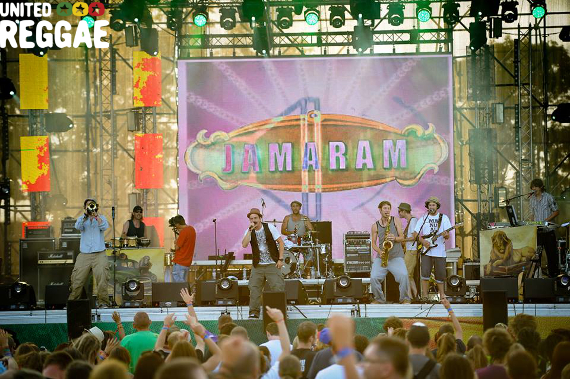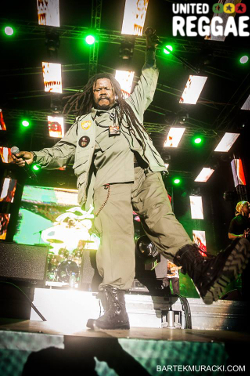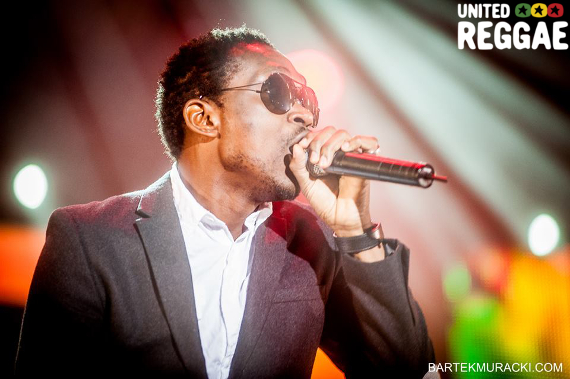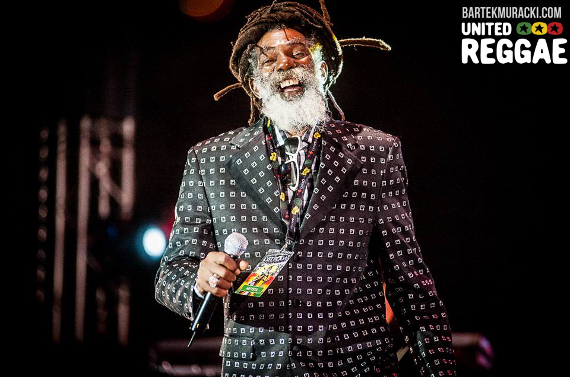Articles about reggae music, reviews, interviews, reports and more...
Ostroda Reggae Festival 2013

Ostroda Reggae Festival 2013
Reggae music has spread everywhere, from Jamaica to Japan and anywhere in between. While some countries like England, France, Germany, and the US make international headlines with their local reggae scenes, others tend to get completely overlooked. The strong reggae movement of Poland falls in that latter category. United Reggae writer Valentin Zill visited Ostróda Reggae Festival 2013 and returned highly surprised by what he saw.
“This really is Poland‘s most important reggae festival,” Maken tells me with a good deal of pride. Miroslaw “Maken” Dzięciołowski is an important figure of the Polish reggae scene, and he is the booker of Positive Music Promotion, the organizer of Ostróda Reggae Festival. British author Chris Salewicz had just told his audience in the Green Stage Room about his personal encounters with Bob Marley. Maken and I are standing besides the stage. I had just mentioned how surprised I was to realize that more than half of the line-up on the main stage consists of Polish artists.
“It dates back to 1983, the year Misty in Roots toured Poland.” It wasn‘t easy for Western bands to tour the Socialist East at that time, he recalls. “Misty in Roots were among the first bands ever to tour on this side of the Iron Curtain.“ Soon thereafter, the Twinkle Brothers were officially invited to Poland to perform on a series of shows organized to support the anti-apartheid movement in South Africa. International solidarity was a core value in Socialist countries, and the Twinkle Brothers‘ arrival at the airport was featured by Polish state television. “Everybody in Poland knows them,” says Maken, smiling all over his face. “We see them as Polish artists even,” he jokes.

Reggae caught on quickly, but getting one‘s hands on Jamaican or English records wasn‘t easy at all. “That definitely helped spur the emergence of a local scene.” The movement grew from strength to strength, and, according to Maken, played an important role in the counter-revolution that eventually reinstalled capitalism in Poland in 1989/1990. When the country joined the European Union in 2004, it became as easy for Polish artists to tour Europe as to travel through Poland. And yet, Polish reggae never caught on outside of Poland.
The language barrier might well be the main culprit for that, I come to conclude over the weekend. Most national artists sing in Polish, and few Europeans bother to learn that language. Finding one‘s way through the beautiful festival town of Ostróda, located about halfways between the Russian enclave Kaliningrad and the Polish capital Warszawa in the Masury region, isn‘t that easy without basic conversational skills in Polish. Most people I met were really trying to help though, and some youngsters even surprised with fluent English or German.
Ostróda Reggae Festival is a household on the Eastern European event calendar. It is an almost legendary festival in Poland. I am surprised by how small the festival is when I arrive at the site. Despite its six stages, the ambiance is that of a happy family party. Ostróda is the family reunion of all those who organize and run the reggae part of Poland - singers, musicians, sound boys, producers, organizers of concerts and dances, journalists, and the hardcore massive. The festival features no less than six stages, five of which are dedicated to celebrating sound system culture. The biggest ones are the Red Stage, the main stage where all the live concerts take place, and the Green Stage, an indoor stage for the big sounds. The campsite is located right next to the festival site, so there‘s only a minimum of walking involved at Ostróda Reggae Festival. That has been made possible by moving it to a former military base - a novum this year. And what better way to put a military base to good use than organizing a festival?
“We hope you won‘t find time to catch a breath [sic] during these three exceptional days,” write the promoters in a little brochure that provides the visitors with all the important information, in Polish as well as in English. Despite the small size of the festival, it is really difficult to find a moment of tranquility unless you are one of those who don‘t mind missing out on anything. You can even enjoy the concerts on the main stage while having your dinner. A fancy smartphone app helps you to find your way around the festival if you’re not willing to carry the paper brochure with you. And of course there’s free WiFi around the festival site.
Shows start exceptionally early on Friday - the first sound, Ras Bass & Mystic Dubs start at 11h am on the Ras Bass & Mystic Dubs Station, and the first band on the main stage, Polish band Root Wise, at 12:30h. I‘ve only just arrived at Warszawa at that time, so I‘m missing out on most of the first day‘s concerts. The 235 kilometers from Warszawa to Ostróda seem much longer than it sounds, as only parts of the road are actual highways. When I arrive at the festival site, I hear Jamaram from Munich, Germany closing their show. Next up are Vavamuffin, a legendary band from Poland, followed by UK group Dub Pistols. Seeing the huge audience they draw - that is the moment where I start to realize how big UK offbeat music is in Poland. And their show is overwhelming. The main stage is smaller here than on most other big reggae festivals, but the generous application of technology makes for gigantic shows on par with much bigger festivals like SUMMERJAM. Three big screens display what several cameramen film from different perspectives. Light effects are lavish and impressive.
 Luciano is the only Jamaican artist on this first night of the festival. He flew over from Jamaica for this single show. That might explain why it takes a while for him to get into it. The show gets solid soon, but even then it‘s no match to when the Messenjah was touring with Dean Fraser back in the days. Tonight, Luciano is playing with Natural Mystic Band from Poland. They are an outright disappointment. It’s all too obvious that they didn’t have enough, if any, time to practice together with Luciano. At least it got a bit better towards the end of the show. And the massive celebrates it anyway. Polish reggae singer and mainstream star Bednarek closes the main stage on this first night of the festival. I had seen his face on a billboard along the Highway towards Warszawa, and my Polish colleague Bartek Muracki tells me why: Bednarek won the second place of Mam talent! in 2010, the Polish version of the Got Talent series, singing Bob Marley’s “Is This Love”. Two of his albums went straight to number one of the Polish charts since, and he has recorded an EP at the Tuff Gong Studio in Kingston. I am heading to my hotel in the meantime, since it has started to rain intensely, the temperature has dropped notably and I’m exhausted from 48hrs on the road. Apparently the organizers aren’t well enough in touch with the Almighty to keep their promise of three days of sunshine.
Luciano is the only Jamaican artist on this first night of the festival. He flew over from Jamaica for this single show. That might explain why it takes a while for him to get into it. The show gets solid soon, but even then it‘s no match to when the Messenjah was touring with Dean Fraser back in the days. Tonight, Luciano is playing with Natural Mystic Band from Poland. They are an outright disappointment. It’s all too obvious that they didn’t have enough, if any, time to practice together with Luciano. At least it got a bit better towards the end of the show. And the massive celebrates it anyway. Polish reggae singer and mainstream star Bednarek closes the main stage on this first night of the festival. I had seen his face on a billboard along the Highway towards Warszawa, and my Polish colleague Bartek Muracki tells me why: Bednarek won the second place of Mam talent! in 2010, the Polish version of the Got Talent series, singing Bob Marley’s “Is This Love”. Two of his albums went straight to number one of the Polish charts since, and he has recorded an EP at the Tuff Gong Studio in Kingston. I am heading to my hotel in the meantime, since it has started to rain intensely, the temperature has dropped notably and I’m exhausted from 48hrs on the road. Apparently the organizers aren’t well enough in touch with the Almighty to keep their promise of three days of sunshine.
I wake up the next morning to a temperature of just 57.2 degrees Fahrenheit, even more rain, and a muddy festival site. I decide to skip the Czwórka Reggae Contest staged at 12h a.m. on the Red Stage, a talent contest for Polish reggae bands, and treat myself to a decent breakfast in town instead. Back at the festival, the Green Stage Room offers welcome shelter from the rain. And reggae infotainment at its best. I get to watch a Polish documentation first, but don’t understand anything due to the lack of subtitles. Next up is the screening of “Babylon”, Franklin Rosso’s 1980 movie starring Aswad’s Brinsley Forde. In English, which is fortunate for me. People sit right on the bare concrete floor, but few seem to mind. Reggae is so much more than “just” music. It’s astonishing how little attention most reggae festival organizers pay to other sides of reggae culture. Ostróda gets it right though. I stay to watch “Rude Boy Story”, the documentary that tells the story of Dub Inc, the independent French reggae band that has taken the world by storm. They had performed at Ostróda Festival in 2007 already.
Towards the evening, the sky clears up much and the sun smiles diffidently. The Gentleman’s Dub Club is the first artist today I’m interested in. It’s their first show in Poland. Their mix of ska and dubstep with reggae and dub flavors goes well with the massive here. The organizers of Ostróda Reggae Festival put much effort into staging the shows. Cameras film from various angles, and their images are displayed on three screens in front of the main stage. The lighting effects on the Red Stage are elaborate and lavish. Much to the liking of Busy Signal, who’s got the next slot. Before he starts, I head back to the Green Stage, where India’s number one sound Reggae Rajahs from New Delhi elate the crowd with a top-ranking dub plate selection that includes Beres Hammond and Shaggy. It’s pure niceness. When I ask the Reggae Rajahs later how they enjoyed their first performance in Poland, they’re unable to find the words to express how stoked they are.

Busy Signal and High Voltage deliver the tightest performance at this festival so far. Busy was scheduled to perform at Ostróda in 2012, but couldn’t show up since he was imprisoned. As if he wanted to make up for that, Busy seems to have brought extra motivation. It’s his first show in Poland. A dancehall set announced as “pure madness” stresses High Voltage’s strengths and has the massive come out of its shell to an extent that is rare. At one point, Busy almost fell off a speaker on stage. A dangerous situation, and a reminder for him to ease up on the accelerator. Daddy U-Roy doesn’t need such reminders anymore. Having reached a venerable old age, more classics than you could count in his luggage, and a backing band with tremendous experience, the Originator never rushes when he takes his audience through his show. Most people in the crowd were born long after 1961, the year in which he started his career. It is, as you might guess by now, his first appearance in Poland. A day earlier, he had discussed with interested fans at the Reggae University session that takes places in the Green Stage Room on Friday and Sunday before the shows start.
The last day of the festival starts with another Reggae University session for me. British author and journalist Chris Salewicz talks about his encounters with Bob Marley. His seminal book “Bob Marley: The Untold Story” has just been translated into Polish. Translator Maciej “Magura” Góralski is present as well and allows Polish attendants to follow the discussion in their mother tongue.
My personal concert schedule starts at 17:30h with Blue King Brown. The Australian band mixes reggae and dancehall with rock and afro beat elements and isn’t short of top-ranking international credentials. Carlos Santana called them “the voice of the street and the band of the future”. Their appearance is another first at Ostróda Reggae Festival: it’s the first Australian band to perform here. They’re here to deliver, not to globalize the line up. And bwoy, do they deliver. They celebrate the diversity they embody to the extent that the audience gets an eight-bar long solo, and lead singer Natalie Pa’apa’a reads a declaration held in the spirit of the festival in Polish. A nice gesture that is well received by the stunned crowd. The bar set that high, it takes Dubtonic Kru to overtake. The band that helped spark the reggae renaissance movement in Jamaica starts with tunes taken from their new album “Evolution”. If you were wondering how they won the Global Battle of the Bands contest in Malaysia in 2011, the answer’s right there on stage. The five members of Dubtonic could all make more money if they accepted other engagements, instead they focus on their own project for the love of music. You hear that, you feel that, and you see that on stage. They perform at Ostróda for the third time, and have a supportive fan base already. Announced by the festival as “Ostróda’s favourites”, they take the time to play a short set together with Kool Johnny Kool. More important to the massive is the appearance of Dawid Portasz, a top-ranking Polish reggae singer. He has recorded an album called “Rastasize” at Tuff Gong Studio, where he met Dubtonic Kru. Dawid sings in English. It’s an unusual Polish-Jamaican joint-venture that works surprisingly well.

Next up are Groundation, a safe bet. I’ve stopped counting already how many times I saw them perform this festival season, but it’s always a joy, as none of their shows is like the one before. Despite their packed travel schedule this year, they seem to be as well-rested as ever. Roots reggae purists rejoice a few moments later when Don Carlos and the Dub Vision Band enter the stage. Dressed in classy dark suits, the Waterhouse rocker and the experienced Californians cruise through Don Carlos’ work lightheartedly. Once the show is over, I decide to call it a day, miss out on the Iration Steppas juggling on the Green Stage and say goodbye to old and newfound friends all over the place.
Smaller festivals offer two big advantages. Firstly, attending them means less stress compared to the overcrowded big ones. Secondly, and even more important, less big names on the line up equals more opportunities to discover new artists. Paired with the highly professional organization of Ostróda Reggae Festival and the incredible commitment to all aspects of reggae shown by the organizers, you get a full weekend of first class entertainment, interesting discoveries all along the way, and enough time to socialize and meet new people. Less can often be more, and in this case, this aphorism definitely holds true.
Read more about this topic
Comments actually desactivated due to too much spams
Browse by categories
Recommended Articles
Latest articles
Recently addedView all
© 2007-2026 United Reggae. All Rights Reserved. Reproduction in whole or in part is prohibited. Read about copyright
Terms of use | About us | Contact us | Authors | Newsletter | A-Z














